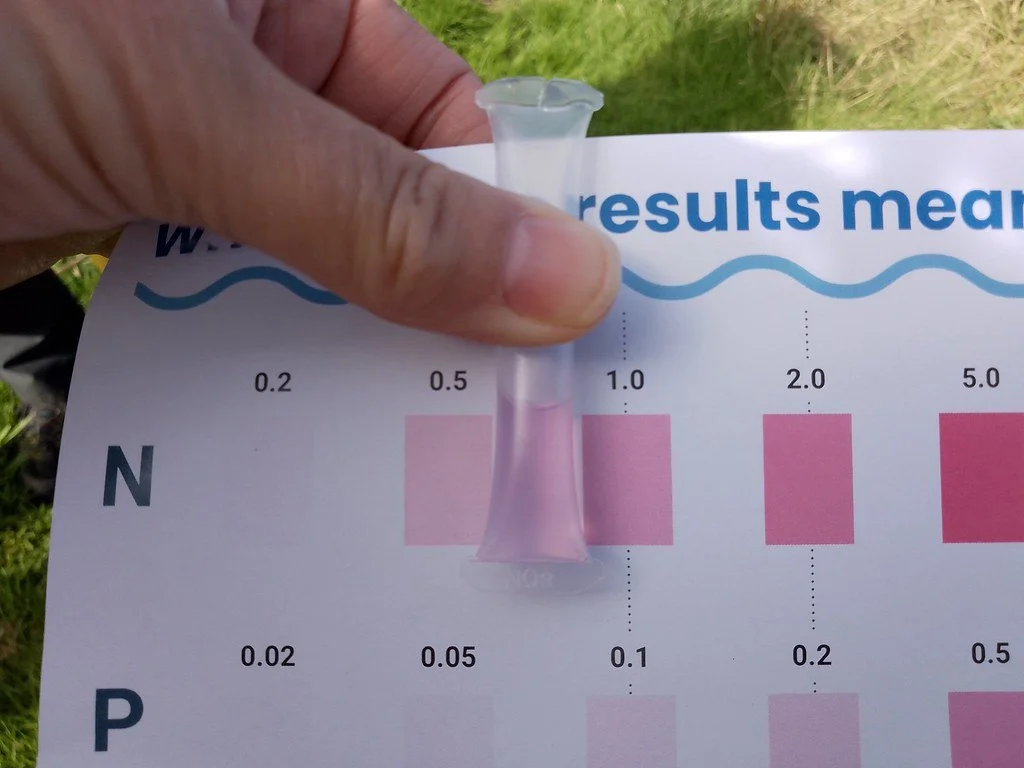Local charity harnesses power of Citizen Science
With water pollution continuing to make headlines across the UK, a Stroud-based conservation charity has been harnessing people power to check in on local waterways.
Measuring results in nitrate and phosphate against the chart
In 2024, it’s estimated that there was a sewage discharge into waterways every 30 seconds or so, resulting in nearly 2,000 sickness reports due to unsafe water. £72.2billion was paid out in profit by water companies, who have racked up £69.2b in debt since they were privatised.
Against this background, in September Stroud Valleys Project (SVP) took part in a nationwide project to assess water pollution, testing our local waterways to see how healthy they are.
“The project involves testing rivers and streams for nitrate and phosphate levels,” explains Fred Miller, who manages habitats for SVP.
Capels Mill, Stroud - Riverfly survey training session
“We’re testing levels in the River Frome at Capel’s Mill in Stroud and at Lynch Rhyne in Berkeley. ‘Rhyne’ is an old Gloucestershire and Somerset word for a drainage stream.
“It’s all part of a Citizen Science scheme organised by the Earthwatch Europe Institute, which aims to highlight water pollution such as sewage in our rivers, and to engage the public in monitoring it.
“The scheme focuses on identifying sources of pollution, and water companies, farmers and landowners would then be encouraged to come up with solutions.”
SVP volunteers used kits from Earthwatch to assess the concentration of nitrate and phosphate, two molecules that can indicate agricultural fertiliser or sewage in the water.
As part of Water Guardians with Gloucs Wildlife Trust, testers used the HANNA phosphate checker
In the River Frome, nitrate was moderate to high, and in the Lynch Rhyne, phosphate was moderate to high.
However, SVP’s monitoring of the waterways isn’t restricted to one project. At Capel’s Mill, there is regular sampling of the populations of Mayflies, Stoneflies and Caddisflies, the larvae of which all live in the river, in collaboration with the Wildfowl and Wetlands Trust.
“These species are sensitive to pollution, so they’re useful indicators of biological health. If their numbers drop below a certain level, we know there are problems – a bit like the proverbial canary in the coal mine.”
The charity has been monitoring the river for several years, with support from local residents.
“This summer there really was a problem!” says Fred. “Just 50 metres downstream from the public footbridge at Capel’s Mill, a drainage pipe was pouring sewage into the river Frome.
“It took months of reporting it repeatedly to the Environment Agency and the water company, Severn Trent, by residents, by ourselves, and by the Rodborough county councillor, before this was remedied in August. It was first reported in October 2024, and it may have been like this for any length of time before it was identified.
“Severn Trent excavated the relevant pipes in Rodborough Field and it seems to have been rectified, which is a success for citizen action.”
Across the district in Berkeley, in the piece of land known as Sarah’s Field which is managed by SVP, the charity is monitoring the rhyne. The drainage channel is being tested as part of a scheme called Water Guardians, which is funded by Wessex Water and managed by Gloucestershire Wildlife Trust.
“In this summer’s drought conditions, the phosphate concentration was up at 2.5 parts per million, which is off the scale!” explains Fred.
“We also tested for faecal coliform bacteria and found that it was positive. This indicates manure or sewage in the water. This has been reported to the Environment Agency, and we hope for a similar success to that at Frome Banks.”
To report a sewage leak into a waterway, visit Check my area | In My Area | Severn Trent Water or call the Environment Agency on 0300 065 3000.



